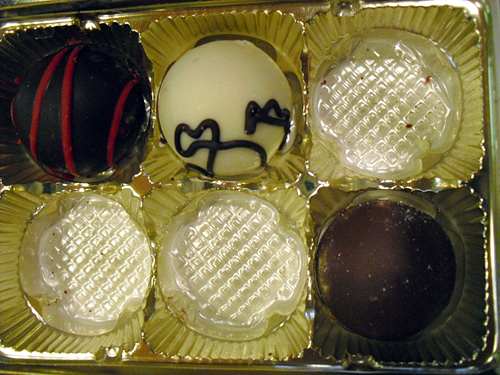If all the raindrops
Were lemondrops and gumdrops
Oh, what a rain that would be!
Standing outside, with my mouth open wide
Ah, ah, ah, ah, ah, ah, ah, ah, ah, ah
If all the raindrops
Were lemondrops and gumdrops
Oh, what a rain that would be!If all the snowflakes
Were candy bars and milkshakes
Oh, what a snow that would be!
Standing outside, with my mouth open wide
Ah, ah, ah, ah, ah, ah, ah, ah, ah, ah
If all the snowflakes
Were candy bars and milkshakes
Oh, what a snow that would be!
These are lyrics from a horrible song by Barney, the big purple dinosaur. The fact that I know it means I've spent too much time working with small children. As you can sense here, the tune unfolds as a series of meditations on a central theme. The first section poses a question and offers up a winsome, catchy answer; the second breathlessly imagines an equally scrumptious scenario, and resolves in the same fashion. Each verse ends with a fantasy plucked straight out of some powdered sugar-smeared four-year old's optimistic re-write of Cloudy with a Chance of Meatballs. What's (sort of) fun about the song though -- at least for four-year olds -- is that the verses lend themselves to inspired free association. If all the night fog were 'nilla fudge and eggnog, for example. The possibilities are limitless so long as you adhere to the childish conceit.
Unless all the sunbeams happened to be kosher salt and sea bream, the world described in this tune would be a wretched place for me to inhabit. Even if widespread stickiness and insect onslaughts didn't pose insurmountable sanitation problems, I would be submerged in gastronomic hell, soaked in a deluge of food I didn't like and everyone else -- joyous screaming little ones skating on lakes of jelly, old ladies slipping on hard candy cobblestones, climbers chewing their way to the tops of cookie mountains -- seemed to love.
Sweets can pretty much shove it. That's the short story, I suppose, but in truth, it's a complicated issue of taste. You see, I like most pies, especially plum, chocolate in croissants and puddings, lemon bars, caramel ice cream, malts, and jelly beans. I respect carrot cake, mostly for its steadfast association with cream cheese frosting. I will rarely refuse a sandwich cookie when it's offered. I am open to enlightenment courtesy of thrilling and creative restaurant desserts of all sorts. Yet I never crave sweet things or go out of my way to consume them. I'm convinced the very bland affection I do muster is a product of 29 years spent immersed in a culture obsessed with them. Desserts are not central to my eating routines, or even peripheral. If they disappeared, I would shed no corn syrupy tears. In the end, I eat them if they are around because, simply put, I will eat nearly anything. Unfortunately, they are often around -- one-dimensional and over-bearing, yet brutally effective at providing the jolts of fat and sugar we're conditioned to desire. Two weeks ago, I was substituting for a flu-ridden history teacher at Lowell High. A kid suggested I let the class leave five minutes early, and I said no. He then asked if I'd accept a chocolate bribe. Having left my meager lunch of leftovers at home, I wondered out loud if he might be able to find me fried chicken instead. Give me the choice between savory and sweet and I'll always lean towards the former.

This frosting-heavy time of year, sweet reigns supreme. In the days leading up to Christmas, office kitchens look like Candyland blooming with cheap chocolate truffles, tins of shortbread, fruitcake, and panettone from Walgreens. Red-and-white canes and Hershey's kisses bulge in stockings. Avid bakers exchange trays of garish cookies iced green, red, and snowy white. Holiday celebrations can be as much about sugar as booze -- particularly work parties, oddly enough. Four years ago, I wore a crisp shirt in the basement of a Financial District hotel and sipped whiskey, glumly watching pastries and puddings vanish from platters as the big boss -- white-maned, stooped, a long arm wrapped around his beaming wife -- grimly intoned that it had been a good year. Hooray, everyone had shouted, thinking of their bonuses, toasting, lowering slices of a towering cake onto plates. The sight of so much confection made me feel sicker than did all the Jack Daniel's I was drinking. I'm prejudiced against sweets. Individuals are reasonably fine, but as a whole population, they rub me the wrong way. So I give out homemade hot sauce and artisanal salame as holiday gifts, and refrain from ordering dessert in restaurants unless I'm with someone's mom or dining in a professional capacity. Part of the problem is the infantile glee sweets elicit in people -- even though they're often described in silly quasi-adult terms -- sinful, indulgent, naughty, and lusty -- and framed as transgressions for which to (eventually) feel guilt. It puts me off. Every late December, cubicle jockeys scuttle down hallways, scarfing whatever delights happen to be circulating around their offices. At the same time, they vocally fret over how their excesses will impact their health and appearance. Inevitably, they resolve to do penance the following week, once the season is over. "I shouldn't be doing this," I once heard a co-worker sigh blandly, her hands digging determinedly into a box for the last lumpy cupcake, "but I'm doing it." Weirdly enough, I first heard those words muttered by the slimy male lead of a classic 1980s adult film. He was committing adultery with the help of two video store clerks, and surfing past a fleeting twinge of contrition.